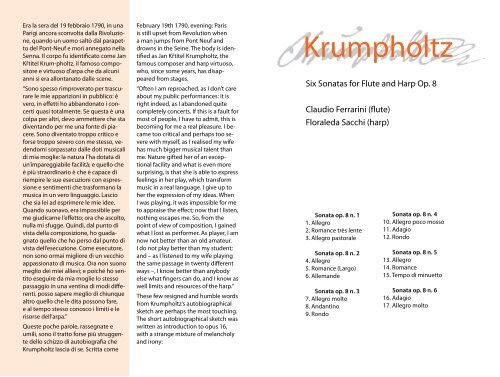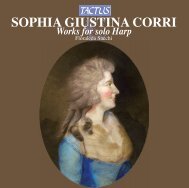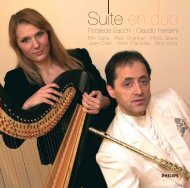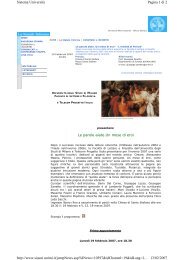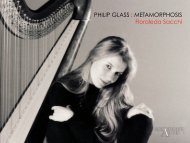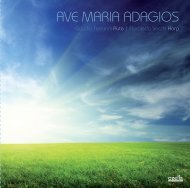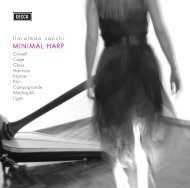download the booklet - Floraleda Sacchi
download the booklet - Floraleda Sacchi
download the booklet - Floraleda Sacchi
You also want an ePaper? Increase the reach of your titles
YUMPU automatically turns print PDFs into web optimized ePapers that Google loves.
Era la sera del 19 febbraio 1790, in una<br />
Parigi ancora sconvolta dalla Rivoluzione,<br />
quando un uomo saltò dal parapetto<br />
del Pont-Neuf e morì annegato nella<br />
Senna. Il corpo fu identificato come Jan<br />
Křtitel Krum-pholtz, il famoso compositore<br />
e virtuoso d’arpa che da alcuni<br />
anni si era allontanato dalle scene.<br />
“Sono spesso rimproverato per trascurare<br />
le mie apparizioni in pubblico: è<br />
vero, in effetti ho abbandonato i concerti<br />
quasi totalmente. Se questa è una<br />
colpa per altri, devo ammettere che sta<br />
diventando per me una fonte di piacere.<br />
Sono diventato troppo critico e<br />
forse troppo severo con me stesso, vedendomi<br />
sorpassato dalle doti musicali<br />
di mia moglie: la natura l’ha dotata di<br />
un’impareggiabile facilità; e quello che<br />
è più straordinario è che è capace di<br />
riempire le sue esecuzioni con espressione<br />
e sentimenti che trasformano la<br />
musica in un vero linguaggio. Lascio<br />
che sia lei ad esprimere le mie idee.<br />
Quando suonavo, era impossibile per<br />
me giudicarne l’effetto; ora che ascolto,<br />
nulla mi sfugge. Quindi, dal punto di<br />
vista della composizione, ho guadagnato<br />
quello che ho perso dal punto di<br />
vista dell’esecuzione. Come esecutore,<br />
non sono ormai migliore di un vecchio<br />
appassionato di musica. Ora non suono<br />
meglio dei miei allievi; e poiché ho sentito<br />
eseguire da mia moglie lo stesso<br />
passaggio in una ventina di modi differenti,<br />
posso sapere meglio di chiunque<br />
altro quello che le dita possono fare,<br />
e al tempo stesso conosco i limiti e le<br />
risorse dell’arpa.”<br />
Queste poche parole, rassegnate e<br />
umili, sono il tratto forse più struggente<br />
dello schizzo di autobiografia che<br />
Krumpholtz lascia di se. Scritta come<br />
February 19th 1790, evening: Paris<br />
is still upset from Revolution when<br />
a man jumps from Pont Neuf and<br />
drowns in <strong>the</strong> Seine. The body is identified<br />
as Jan Křtitel Krumpholtz, <strong>the</strong><br />
famous composer and harp virtuoso,<br />
who, since some years, has disappeared<br />
from stages.<br />
“Often I am reproached, as I don’t care<br />
about my public performances: it is<br />
right indeed, as I abandoned quite<br />
completely concerts. If this is a fault for<br />
most of people, I have to admit, this is<br />
becoming for me a real pleasure. I became<br />
too critical and perhaps too severe<br />
with myself, as I realised my wife<br />
has much bigger musical talent than<br />
me. Nature gifted her of an exceptional<br />
facility and what is even more<br />
surprising, is that she is able to express<br />
feelings in her play, which transform<br />
music in a real language. I give up to<br />
her <strong>the</strong> expression of my ideas. When<br />
I was playing, it was impossible for me<br />
to appraise <strong>the</strong> effect; now that I listen,<br />
nothing escapes me. So, from <strong>the</strong><br />
point of view of composition, I gained<br />
what I lost as performer. As player, I am<br />
now not better than an old amateur.<br />
I do not play better than my student;<br />
and – as I listened to my wife playing<br />
<strong>the</strong> same passage in twenty different<br />
ways –, I know better than anybody<br />
else what fingers can do, and I know as<br />
well limits and resources of <strong>the</strong> harp.”<br />
These few resigned and humble words<br />
from Krumpholtz’s autobiographical<br />
sketch are perhaps <strong>the</strong> most touching.<br />
The short autobiographical sketch was<br />
written as introduction to opus 16,<br />
with a strange mixture of melancholy<br />
and irony:<br />
Krumpholtz<br />
Six Sonatas for Flute and Harp Op. 8<br />
Claudio Ferrarini (flute)<br />
<strong>Floraleda</strong> <strong>Sacchi</strong> (harp)<br />
Sonata op. 8 n. 1<br />
1. Allegro<br />
2. Romance très lente<br />
3. Allegro pastorale<br />
Sonata op. 8 n. 2<br />
4. Allegro<br />
5. Romance (Largo)<br />
6. Allemande<br />
Sonata op. 8 n. 3<br />
7. Allegro molto<br />
8. Andantino<br />
9. Rondo<br />
Sonata op. 8 n. 4<br />
10. Allegro poco mosso<br />
11. Adagio<br />
12. Rondo<br />
Sonata op. 8 n. 5<br />
13. Allegro<br />
14. Romance<br />
15. Tempo di minuetto<br />
Sonata op. 8 n. 6<br />
16. Adagio<br />
17. Allegro molto


